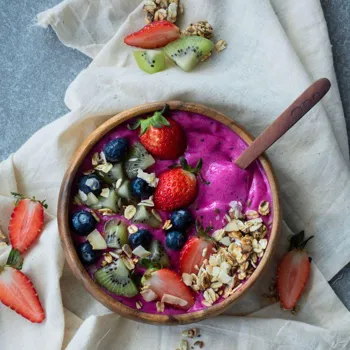10 Ways to Celebrate National Nutrition Month Every Day - A guide to healthy living habits beyond March. Dive in for daily tips!
National Nutrition Month is celebrated every March, but good nutrition isn't
just for one month! It's a year-round thing! Thinking about what we eat shouldn't be a chore, but a way to feel good and have the energy to do all the things we love.
Let's explore ten simple ways to make healthy choices a part of our daily life. We are not covering anything about Pregnancy, violence, sexual crimes or anything similar
Start Your Day Right with a Wholesome Breakfast:
Think of breakfast as the fuel that powers your day. Instead of sugary cereals or processed foods, opt for something packed with nutrients. A bowl of oats with fruits and nuts is a great option. You could also quickly whip up a vegetable poha or upma. Make time, even if it's short.

A good breakfast sets the stage for healthier decisions throughout the day. This way you avoid cravings, and have energy for daily activities. Try and experiment with millets, such as ragi, bajra, they are great for health. So you can mix and match them with your other ingredients.
Hydrate, Hydrate, Hydrate:
Water is essential for everything your body does. From digestion to keeping your skin healthy, water is the unsung hero. Aim for at least 8 glasses of water a day. Keep a water bottle with you and sip on it throughout the day.

You can also add some slices of cucumber or lemon to your water for a refreshing twist. Remember, feeling thirsty is often a sign that you're already a bit dehydrated. You can also drink fruit juices which are not processed, and don't contain preservatives. Hydration helps to avoid fatigue.
Embrace the Power of Fruits and Vegetables:
Fruits and vegetables are loaded with vitamins, minerals, and fiber. They're like nature's multi-vitamins! Try to include a variety of colorful fruits and vegetables in your daily meals. Add spinach to your dal, snack on carrots and cucumbers, or add fruits to your morning cereal.
Aim for at least five servings a day. There are many other vegetable options such as broccoli, cauliflower, kale etc. They're also low in calories and high in satisfaction, so they're great for maintaining a healthy weight. You can make them into a delicious salad.
Read Nutrition Labels Carefully:
Become a smart shopper by learning to read nutrition labels. Check for the amount of sugar, salt, and unhealthy fats in processed foods. Look for foods that are low in these ingredients and high in fiber and nutrients. This helps you make informed choices and avoid hidden unhealthy ingredients!
It's also very important to read the ingredient list. The fewer the ingredients, the better. Try to choose whole, unprocessed foods whenever possible. Avoid food that is overly processed.
Plan Your Meals:
Planning your meals for the week can save you time, money, and calories! When you have a plan, you're less likely to grab unhealthy snacks or order takeout. Take some time on the weekend to plan your meals for the week and create a shopping list.
Prepare some things in advance, like chopping vegetables or cooking grains. Having healthy options readily available makes it easier to stick to your nutrition goals. You can download planner templates or even build one on your device.
Cook at Home More Often:
Cooking at home gives you control over the ingredients and portion sizes. It's also a great way to experiment with new recipes and learn about different foods. Instead of eating out or ordering in, try cooking at home a few times a week.
Start with simple recipes and gradually work your way up to more complex dishes. Involve the whole family in the cooking process for some fun! Cook fresh and hygienic food at house to avoid any problem from consumption of outside food. This will also save money.
Choose Whole Grains:
Whole grains are a great source of fiber, which helps you feel full and satisfied. They also provide essential nutrients like B vitamins and iron. Instead of refined grains like white bread and white rice, choose whole grains like whole wheat roti, brown rice, and millets.
Look for products that list whole grains as the first ingredient. Whole grain foods helps in proper bowel movement and provide energy. Whole grain options provide additional benefits compared to processed ones
Snack Smartly:
Snacking can be a part of a healthy diet, but it's important to choose your snacks wisely. Avoid sugary drinks, chips, and other processed snacks. Instead, opt for healthy snacks like fruits, nuts, seeds, or yogurt.
Keep healthy snacks readily available so you're less tempted to reach for unhealthy options. Snacking between meals prevent you from overeating doing lunch or dinner. Choose fruits with low sugar.
Be Mindful of Portion Sizes:
Even healthy foods can contribute to weight gain if you eat too much of them. Be mindful of portion sizes and try to eat until you're satisfied, not stuffed. Use smaller plates and bowls to help control your portions. Pay attention to your body's hunger cues and stop eating when you're full.
It takes some time for the stomach to communicate with brain. So, make sure to avoid overeating. This ensures stomach health and prevents unwanted medical conditions.
Make Gradual Changes:
Making drastic changes to your diet can be overwhelming and unsustainable. Instead of trying to change everything at once, focus on making gradual changes over time. Start by adding one healthy habit to your day. Once you've mastered that, add another one.
Small, sustainable changes are more likely to lead to long-term success. Take a small change that suits individual and be consistent with time for better results.
























